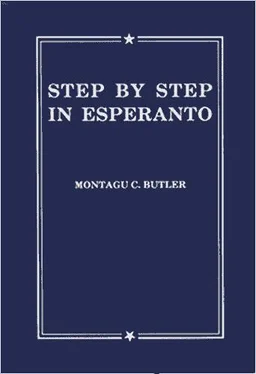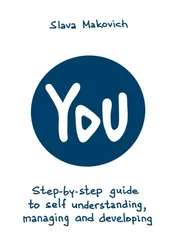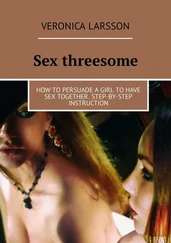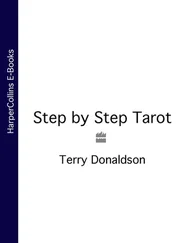1108. Summary of Grammatical Endings
| The ending |
denotes |
| O |
Noun |
Helpo, help |
| A |
Adjective |
Helpa, helpful |
| E |
Adverb |
Helpe, helpfully |
| I |
Infinitive |
Helpi, to help |
| U |
Imperative |
Helpu! help! |
| J |
Plural |
Helpoj, helps |
| N |
Accusative |
Sendu helpon, send help |
Simple Tenses
| The ending |
denotes |
| I |
S |
Past |
Mi helpis, I helped |
| A |
Present |
Mi helpas, I help |
| O |
Future |
Mi helpos, I shall help |
| U |
Conditional |
Mi helpus, I should help (if)… |
Passive Participles
| The ending |
denotes |
| I |
T |
Past |
Helpita, (having been) helped |
| A |
Present |
Helpata, being helped |
| O |
Future |
Helpota, about to be helped |
Active Participles
| The ending |
denotes |
| I |
NT |
Past |
Helpinta, having helped |
| A |
Present |
Helpanta, helping |
| O |
Future |
Helponta, about to help |
The framework of the Esperanto grammar thus consists of 14 letters, viz.: O, A, E, I, U, J, N;with S (simple tense), T( participle ), and N( active voice ) preceded by I, A,and O (past, present, future), and, in the case of us,by U( conditional ). See Table of Correlatives.
Compound Tenses
(«Kunmetitaj tempoj»)
1109. Any of the six forms esti, estu, estas, estis, estos, estusmay be combined with the six participal forms anta, inta, onta, ata, ita, ota,to form what are called “compound tenses”. Thus, with the participles amanta, loving, and amata, (being) loved, we form:
Esti amanta, to be loving.
Estu amanta, be loving.
Mi estas amanta, I am loving.
Mi estis amanta, I was loving.
Mi estos amanta, I shall he loving.
Mi estus amanta, I should be loving,
Esti amata, to be (being‑) loved.
Estu amata, be (being‑) loved.
Mi estas amata, I am (being‑) loved.
Mi estis amata, I was (being‑) loved.
Mi estos amata, I shall be (being‑) loved.
Mi estus amata, I should be (being‑) loved.
Make a similar table with amonta, amota.
1110. The past participles ( aminta, amita) are used regularly in the same way. English, however, complicates matters here by introducing the word have. Thus:
Mi estas aminta, I am having-loved = I have loved.
Mi estas amita, I am (having-been) loved = I have been loved.
Mi estis aminta, I was having-loved = had loved.
Mi estis amita, I was (having-been‑) loved = I had been loved.
And so on.
1111. N.B. — The tense of estdepends upon the time of which one speaks: that of the participle upon the time of the action in relation to this.
| esti |
to be |
} × { |
amonta |
about-to-love |
| estu |
be |
amota |
about-to-be-loved |
| li estas |
he is |
amanta |
loving |
| li estis |
he was |
amata |
(being‑)loved |
| li estos |
he will be |
aminta* |
having-loved |
| li estus |
he would be |
amita* |
(having-been) loved |
(b)* Before ita, inta,English translates estby have, thus
| li estas |
he has |
} × { |
aminta (min), loved (me) |
| li estis |
he had |
| li estos |
he will hare |
amita (de mi), been loved(by me) |
| li estus |
he would have |
1113. (a) Hieraŭ mi bakIS pomonje la tria (horo).
Je la {2ª, 3ª, 4ª} la pomo estIS bak{O,A,I}ta,mi estIS bak{O,A,I}ntaĝin.
(b) Hodiaŭ mi bakAS pomonje la tria.
Je la {2ª, 3ª, 4ª} la pomo estAS bak{O,A,I}ta,mi estAS bak{O,A,I}ntaĝin.
(c) Morgaŭ mi bakOS pomonje la tria.
Je la {2ª, 3ª, 4ª} la pomo estOS bak{O,A,I}ta,mi estOS bak{O,A,I}ntaĝin.
(d) Se mi bakUS pomonje la tria,
Je la {2ª, 3ª, 4ª} la pomo estUS bak{O,A,I}ta,mi estUS bak{O,A,I}ntaĝin.
«Jen tri domoj, kiel ili staras en la somero»
1114. PRINTEMPE la konstruisto diras, ke en la somero la domo {1, 2, 3} estOS konstru{O,A,I}ta.



SOMERE mi vidas, ke la domo {1, 2, 3} estAS konstru{O,A,I}ta.
VINTRE mi memoras, ke en la somero la domo {1, 2, 3} estIS konstru{O,A,I}ta.
1115. (a) MI TRINK ISAKVON. Antaŭ ol mi komencis trinki, mi est istrink onta, kaj la akvo est istrink ota. Dum la akvo fluis en mian buŝon, mi est istrink anta, kaj la akvo est istrink ata. Kiam la glaso estis malplena, mi est istrink inta, kaj la akvo est istrink ita.
(b) MI TRINK ASAKVON. Antaŭ ol mi komencas trinki, mi est astrink onta, kaj la akvo est astrink ota. Dum la akvo fluas en mian buŝon, mi est astrink anta, kaj la akvo est astrink ata. Kiam la glaso estas malplena, mi est astrink inta, kaj la akvo est astrink ita.
(c) MI TRINK OSAKVON. (d) SE MI TRINK USAKVON… Expand these sentences into paragraphs after the models in (a) (b), using estos, estusrespectively, and translate.
———
1116. Ĉio estas finita. Se li estus tiklata,li ridus. La lupo estis ĉasata du horojn. Mia nomo estas bone konata. La historio estas daŭrigota. Mi ne estis naskita tiam. Li estis tuj pendigota, kiam alvenis pardono. La libro estos presata tri jarojn. Se mi estus venkita, mi hontus. Dio estu laŭdata. Mi deziras, ke la laboro estu farita, kaj ne, ke ĝi estu farota. Ĝi ne povus esti farita jam nun! Mi dezirus esti lulata en la dormon per via kantado. Mi amas la senton esti kisota.
Читать дальше















